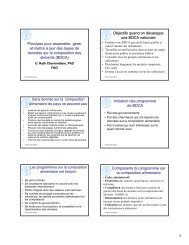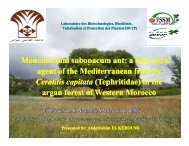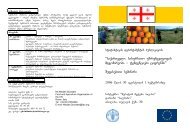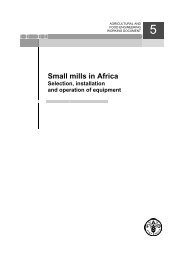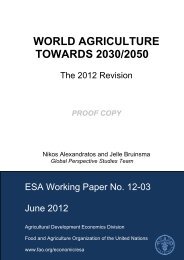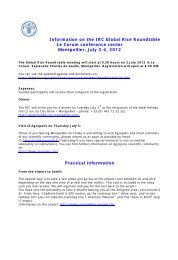Climate Change and Food Security: setting the track for the ... - FAO
Climate Change and Food Security: setting the track for the ... - FAO
Climate Change and Food Security: setting the track for the ... - FAO
Create successful ePaper yourself
Turn your PDF publications into a flip-book with our unique Google optimized e-Paper software.
Many of <strong>the</strong> world’s poorest people are rural women in developing countries who depend on<br />
subsistence agriculture to feed <strong>the</strong>ir families.<br />
Add: migration, refugees<br />
3. Adaptation to climate change<br />
Title: Responses to climate change<br />
Starting by stating <strong>the</strong> need to stop dangerous climate change, integrating food security <strong>and</strong><br />
agriculture into UNFCCC process, in order not to jeopardize food security fur<strong>the</strong>r.<br />
Trans<strong>for</strong>mation of work food systems into climate smart recognizing <strong>the</strong> need to attain <strong>the</strong><br />
multiple goals of food security, adaptation <strong>and</strong> mitigation. In agriculture it is difficult <strong>and</strong> mostly<br />
not meaningful to separate adaptation <strong>and</strong> mitigation since most of <strong>the</strong> climate smart farming<br />
practices have synergies between <strong>the</strong>se two while increasing productivity. After this type of<br />
introduction one could discuss as below specific aspects of adaptation <strong>and</strong> mitigation.<br />
a – Observed adaptation <strong>for</strong> food security <strong>and</strong> nutrition<br />
Developing <strong>and</strong> assessing <strong>the</strong> adaptation responses<br />
You have only agronomic responses here what about livelihood strategy responses including<br />
diversification of income sources, labour migration, remittances<br />
5. Recommendations <strong>for</strong> policies <strong>and</strong> actions<br />
How to design <strong>and</strong> implement good overall development policies <strong>and</strong> programs? Linking policy on<br />
climate change <strong>and</strong> food security, <strong>and</strong> taking an integrated response to addressing food <strong>and</strong><br />
nutrition security, agricultural productivity <strong>and</strong> climate change.<br />
Here one should talk about multiple goals <strong>and</strong> integration of policies, intagraion of climate issues<br />
into sectoral polices like agriculture but also complementary financing mechanisms <strong>for</strong> reaching<br />
multiple objectives<br />
Marja-Liisa Tapio-Bistrom<br />
Senior officer<br />
<strong>Climate</strong>, Energy <strong>and</strong> Tenure division<br />
Natural Resources Management <strong>and</strong> Environment Department<br />
<strong>FAO</strong><br />
40. Marielle Dubbeling from <strong>the</strong> RUAF Foundation, <strong>the</strong> Ne<strong>the</strong>rl<strong>and</strong>s<br />
The proposed study seems to focus on rural food security <strong>and</strong> nutrition. Though not denying<br />
<strong>the</strong>ir importance, it is underestimating urban food insecurity. Most of <strong>the</strong> population will live in<br />
cities by 2050. In many African, Latin American <strong>and</strong> Asian cities already a third to half <strong>the</strong><br />
population live in in<strong>for</strong>mal or illegal settlements lacking adequate provision <strong>for</strong> water,<br />
sanitation, drainage, health care, schools….. <strong>and</strong> with <strong>the</strong>ir nutritional status compromised<br />
because such a high proportion of <strong>the</strong>ir income goes to paying rent, water vendors/kiosks, pay<br />
toilets (as <strong>the</strong>y have no toilets in <strong>the</strong>ir home), keeping children at school (often having to send<br />
<strong>the</strong>ir children to cheap private schools because <strong>the</strong>y cannot get <strong>the</strong>m into government schools),<br />
private health care (cannot get public health care…) transport (especially <strong>for</strong> those that live in<br />
peripheral locations) (personal comment David David Satterthwaite- IIED).<br />
__________________________________<br />
Global Forum on <strong>Food</strong> <strong>Security</strong> <strong>and</strong> Nutrition<br />
http://km.fao.org/fsn<br />
28



